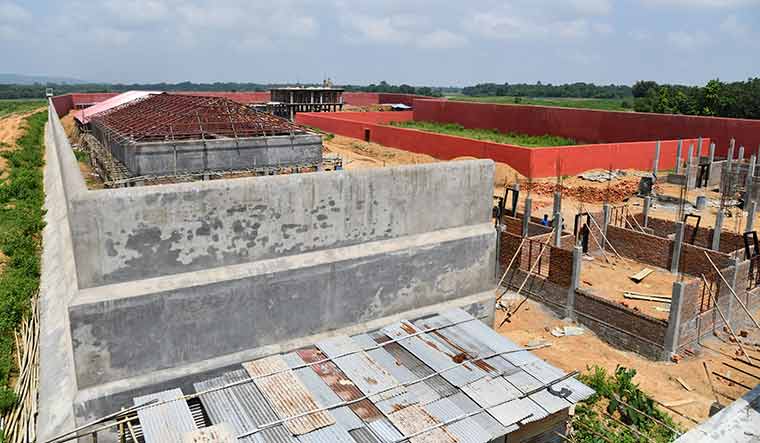DULAL CHANDRA PAUL died a broken, stateless man. The 64-year-old was in police custody since 2017, after a Foreigners’ Tribunal (FT) in Assam ruled that he was not an Indian citizen. Paul, from Alisinga village in Assam’s Sonitpur district, was lodged in a detention centre attached to the district jail. As his health deteriorated, he was shifted to Guwahati Medical College Hospital, where he died on October 13, 2019. Paul’s family refused to accept his body for 10 days, demanding that the authorities first remove the ‘Bangladeshi’ tag and declare him an Indian. They relented only after the government promised a thorough probe into the issue.
People in Assam are livid over Prime Minister Narendra Modi’s claim that there are no detention centres in India. “If that is the case, then will the prime minister please inform us where my father was kept for two years before he died?” asked Paul’s son, Ashish. He said despite having all the required documents, Paul was declared a ‘foreigner’ and was put behind bars, even as the rest of the family continued to live as Indian citizens. “The BJP government will now give citizenship to all Bangladeshi migrants, whereas my father, an Indian, was made to die a foreigner. The government which cannot give justice to its own people is now trying to welcome outsiders and make them Indians,” said Ashish.
Police sources said there were six detention centres in Assam, with a capacity to house 1,145 inmates. The government is setting up ten more, including a large one at Matia in Goalpara, 150km west of Guwahati. The Matia centre alone can accommodate up to 3,000 inmates.
“When detention centres are monitored by district administrations, how can the prime minister deny their existence? It is a white lie,” said a lawyer who handles citizenship cases. Assam’s leader of opposition Debabrata Saikia said the idea of detention camps for foreign nationals awaiting deportation was first mooted in 1998 by the Atal Bihari Vajpayee regime. The Union home ministry had then issued a directive for the purpose. Saikia said the Modi government issued three similar directives in 2014, 2018 and 2019.
“The last one was issued in January 2019, asking all states and Union Territories to set up at least one detention camp under their jurisdiction. This was confirmed in the Lok Sabha on July 2 by the Minister of State for Home Affairs Nityanand Rai,” said Saikia. “Yet, Modi has the audacity and shamelessness to say in public that no detention camp exists in India.”
Those who cannot find a place in the National Register of Citizens in Assam and are unable to prove their citizenship will be sent to the Matia detention centre. Hundreds of workers are engaged at Matia to speed up the delayed construction. The complex, which is spread over an area of 2.5 hectares, will have 15 four-storey buildings. It will have a hospital, an auditorium, a common kitchen and 180 toilets and washrooms. There will be a primary school close to the centre. A 20-feet-high outer wall and a six-feet-high inner wall, complete with watchtowers, will keep detainees from moving out of their designated areas.
Top police officials told THE WEEK that the detention centres were not like regular jails. All rooms have proper doors and windows. Special facilities are available for nursing mothers and women with children. Intermixing of the genders, however, will not be allowed.
It, therefore, came as a surprise for most people in Assam when Modi said there were no detention centres in the state. “Modi is a liar,” said former chief minister Tarun Gogoi. He said when he was chief minister his government built detention centres as ordered by the High Court. “In 2018, the Modi government sanctioned Rs46 crore for constructing the detention centre at Matia. Suddenly, Modi says there are no detention camps,” said Gogoi.
Living conditions in the six detention centres in Assam located at Goalpara, Kokrajhar, Silchar, Dibrugarh, Jorhat and Tezpur are largely appalling. As many as 1,043 inmates—of which 1,025 are from Bangladesh and the rest from Myanmar—are languishing at these centres, which are located in regular jail complexes. Detainees suffer from mental and physical ailments. Many of them suffer from depression as they are not allowed to meet their families. They are also not allowed to work for a wage.
Assam has nearly 100 FTs that handle cases sent to it by the Assam Police Border Organisation, whose primary job is to detect and detain foreign nationals. Amman Wadud, a lawyer specialising in such cases, said the process was flawed. “There are cases where Indians, whose forefathers had never been in any place in Bangladesh, are declared foreigners because they could not furnish the required documents,” he said.
Kargil War veteran Mohammed Sanaullah, for instance, had to spend 10 days in a detention camp after an FT declared him a foreigner. “I have served in difficult places like Kashmir and Manipur,” said Sanaullah. “But nothing had prepared me for life in a detention centre. It was actually a prison. Even years of serving in dangerous places and living under dangerous circumstances could not prepare me for the ten days I spent in such a camp.”


